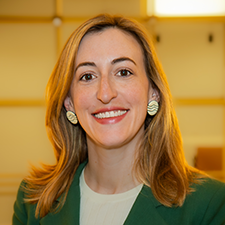Dr. Bethany (Beth) Percha is Adjunct Assistant Professor of Biomedical Informatics at Columbia University and Chief Data and Analytics Officer at NewYork-Presbyterian Hospital. Previously, she was Chief Data Officer at Summit Health/CityMD, a large multispecialty and urgent care network in the northeast, staying on after its acquisition by VillageMD/Walgreens to lead data engineering, governance, and operations across all VillageMD markets and business lines. Prior to her role at Summit, Beth was CTO of the Precision Health Enterprise (PHE), an applied research and product development group at the Mount Sinai Health System, and head of R&D at the Health Data and Design Innovation Center (HD2i), Mount Sinai’s first Silicon Valley outpost. She was formerly Vice President of Research and Development at Kyron, a venture-backed startup building an information retrieval platform for electronic medical records. She has also served as a technical adviser for several other health technology startups in New York and Silicon Valley.
The overarching goal of Beth’s research is to develop methods that allow data to inform the practice of medicine. In particular, she sees great potential in the mountains of observational and unstructured data that we collect daily in the form of electronic medical records (EMRs), scientific and clinical documents, and public databases of all kinds. Her main research focus is biomedical natural language processing – using machine learning to extract structured information from the unstructured text of the biomedical research literature and clinical documents. Her dissertation, which won the AMIA Doctoral Dissertation Award, described a new method for mining the unstructured text of the scientific literature to uncover relationships among drugs, genes, diseases and side effects and connect them to important biomedical phenomena like drug-drug interactions and patient-level variation in drug response. She is the creator of the Global Network of Biomedical Relationships (GNBR), a scientific resource that represents the biomedical research literature as a network of structured facts that can be searched or combined to generate new hypotheses. GNBR has been downloaded over 27,000 times to date and is used in academia and industry.
Aside from research, Beth is committed to expanding the understanding and use of data science in healthcare. At Stanford, she was part of the design team for a new course on data driven medicine and taught the machine learning and statistics component of the course for three years. She was the machine learning instructor for the Health Data Academy at Arizona State University and designed an introductory data science course for medical fellows at Mount Sinai in the 2020-2021 academic year. Beth received her PhD in Biomedical Informatics from Stanford University, her MPH in Biostatistics and Epidemiology from the University of Michigan, and her BS in Physics, Biochemistry and Math (also from UM).
The overarching goal of Beth’s research is to develop methods that allow data to inform the practice of medicine. In particular, she sees great potential in the mountains of observational and unstructured data that we collect daily in the form of electronic medical records (EMRs), scientific and clinical documents, and public databases of all kinds. Her main research focus is biomedical natural language processing – using machine learning to extract structured information from the unstructured text of the biomedical research literature and clinical documents. Her dissertation, which won the AMIA Doctoral Dissertation Award, described a new method for mining the unstructured text of the scientific literature to uncover relationships among drugs, genes, diseases and side effects and connect them to important biomedical phenomena like drug-drug interactions and patient-level variation in drug response. She is the creator of the Global Network of Biomedical Relationships (GNBR), a scientific resource that represents the biomedical research literature as a network of structured facts that can be searched or combined to generate new hypotheses. GNBR has been downloaded over 27,000 times to date and is used in academia and industry.
Aside from research, Beth is committed to expanding the understanding and use of data science in healthcare. At Stanford, she was part of the design team for a new course on data driven medicine and taught the machine learning and statistics component of the course for three years. She was the machine learning instructor for the Health Data Academy at Arizona State University and designed an introductory data science course for medical fellows at Mount Sinai in the 2020-2021 academic year. Beth received her PhD in Biomedical Informatics from Stanford University, her MPH in Biostatistics and Epidemiology from the University of Michigan, and her BS in Physics, Biochemistry and Math (also from UM).


